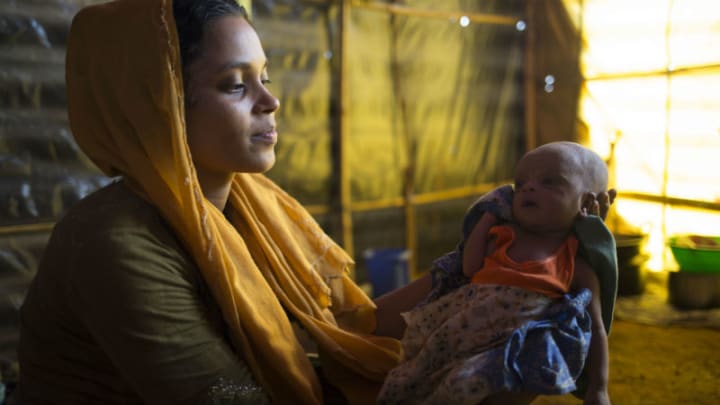
As a single mother of two girls, I spend a lot of time thinking about how to give my daughters the best start in life. I think about their education, health, and yes, I think about how their gender might impact their experiences along the way.
When I’m at work, I can’t help but think about the impact of gender inequality. I know that women are disproportionately affected by conflict and natural disasters, and I unfortunately don’t have to look very hard to see what this means.
Eighteen months ago, more than 700,000 people fled violence in Myanmar to Cox’s Bazar in southeast Bangladesh. Seemingly overnight Bangladesh became home to the largest refugee camp in the world. More than 50 percent of those in the camps are women and girls.
From the outset of the crisis, the Red Cross has seen firsthand how women are impacted. Forced by fears of traveling alone or of compromising their dignity, many women go to the toilet in or near their shelters, increasing the risk of disease. Others may travel to the toilets during the cover of darkness, when it can be even more dangerous.
The British Red Cross is working in the camps to provide a safe sanitation system. It became apparent very early on that women weren’t using some of the latrines that were being built. Working with our local colleagues at the Bangladesh Red Crescent Society, we set up female community groups to review the latrines and wash points. Simple things such as ensuring male and female toilets are an appropriate distance apart and creating special shelters for washing and drying of sanitary towels meant that we saw more women use the facilities. It also meant that women became a key part of the humanitarian response.
One thing I have learned during my five years with the Red Cross is that every crisis is personal. We’ve learned it’s important to be as local as possible and as international as necessary. International Red Cross staff with experience working in refugee camps work side-by-side with the local staff to tailor our approaches to the needs of the community.
Most recently, I have been reminded of how truly important this is in the Democratic Republic of the Congo.
The DRC is facing the worst Ebola outbreak in the country's history. Though we might hear less about it in our mainstream news, it is an epidemic that could reach the proportions of the 2014 West Africa outbreak, which killed more than 11,000 people.
Ebola has found its way into an area where there is complex and violent conflict, making it difficult for humanitarian workers to reach at-risk communities. The legacy of violence also means that even when there is access, people are often scared and suspicious.
Building trust has become a key priority of the Red Cross’ Ebola response. More than 360 local Red Cross volunteers are conducting community engagement in affected areas. So far, around 700,000 people have been reached in this way.
Again, in this context we see more women affected; they are the primary caregivers and more likely to prepare bodies for burial. This not only puts them more at risk of contracting the virus, but also the people they look after, especially children. We’ve learned that it’s important to alter responses — for example, we’re recruiting more local female volunteers, holding specific focus groups for women, working with women associations, and tailoring the information distributed. In a climate where humanitarian aid workers are not always seen as the good guys, working with women in the community is vital to successfully halting the spread of this deadly virus.
International Women’s Day is an important time to reflect on the work we are doing to help empower women and girls around the world. From giving a space to ensure women can voice concerns, to supporting women to lead the response, encouraging empowerment does not have to be ground-breaking. I know if anything happened to my children, I would want to have the power to make decisions about their protection and support. This makes me more determined than ever to ensure woman are able to play a greater role in reducing the impact of gender during humanitarian crisis.




